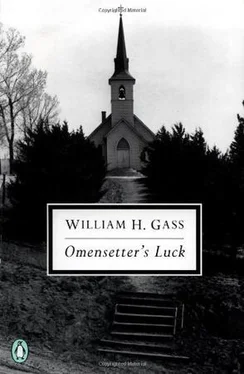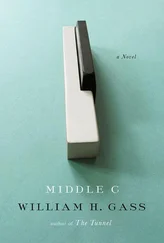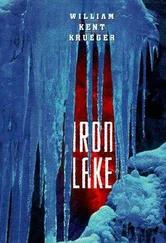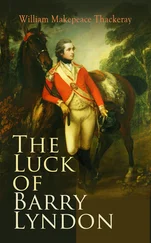Doctor Orcutt, thought Henry. I hate him. His teeth slide in his beard and his eyes cross.
Come out of the door. Are you hearing me? Henry? When he was here he stared at me like an owl.
You should comb your hair.
It was indecent — how he stared. Stared. He's just an animal. Hairy as a bear. His head turns the whole way around.
I'm going.
Go then. Go. You'll pass in the woods, the two of you. I know. You'll pass. Must you be walking there? You're catching cold again. I saw you shiver.
No.
Like an old dog going everywhere there is a patch of sun to sit and shiver in. No one ever comes to see us. People used to — Gladys, Rosa, Mat. No one now since you were sick. He always takes the wood path. Why?
It saves time.
Time? Oh dear. Time. The animal. Smell him. There's no time to him. There's only himself. Like a cow whose bowels are moving. Heavens — time. What do you want from him? You'll never get it, whatever it is. He cares for no one, don't you know that? Not even you, Henry. Oh look what you're doing — letting the wind in. Shut the door.
The path took Henry Pimber past the slag across the meadow creek where his only hornbeam hardened slowly in the southern shadow of the ridge and the trees of the separating wood began in rows as the lean road in his dream began, narrowing to nothing in the blank horizon, for train rails narrow behind anybody's journey; and he named them as he passed them: elm, oak, hazel, larch and chestnut tree, as though he might have been the fallen Adam passing them and calling out their soft familiar names, as though familiar names might make some friends for him by being spoken to the unfamiliar and unfriendly world which he was told had been his paradise. In God's name, when was that? When had that been? For he had hated every day he'd lived. Ash, birch, maple. Every day he thought would last forever, and the night forever, and the dawn drag eternally another long and empty day to light forever; yet they sped away, the day, the night clicked past as he walked by the creek by the hornbeam tree, the elders, sorrels, cedars and the fir; for as he named them, sounding their soft names in his lonely skull, the fire of fall was on them, and he named the days he'd lost. It was still sorrowful to die. Eternity, for them, had ended. And he would fall, when it came his time, like an unseen leaf, the bud that was the glory of his birth forgot before remembered. He named the aspen, beech, and willow, and he said aloud the locust when he saw it leafless like a battlefield. In God's name, when was that? When had that been?
Omensetter was in his large coat today. Pieces appeared between the trees. Then tousled hair. Round hot face: determined, splotched. Pebbly teeth. His arm was lifted in a wave. This disappeared. His hand sprang out of a limb. Henry began to trot. Omensetter crossed a small glade, his feet hidden by bushes. A branch leaped in front of Henry and split his vision at its waist. His pulse grew noisy in his ears. We must take care, he thought, everything is against us.
The elder's pods won't hang through winter I'm afraid, Omensetter said. The moss is thick and the caterpillar's, fur is deep.
I thought I'd walk your way, Henry said, for exercise. Omensetter laughed. His teeth were bleached.
It wasn't for the rent, I knew you'd be along with that… And how's the boy?
The boy is fine. We have him sleeping south to catch the sun.
What have you named him, I haven't heard.
Amos.
Omensetter lingered on the word.
I've an uncle of that name who's rich.
He chuckled.
Lovely, Henry said. Amos Omensetter. Yes. Lovely. And the girls?
The girls?
How are they?
They're fine, and Lucy's fine. The dog is fine too. So am I.
Good, said Henry. Fine.
The aspen's leaves, he saw, were yellow early. Omensetter held money in his hand. There was a spatter of red in the maples. There me money was and there the end was. It would settle in his hand and be good-bye. Omensetter would present his back and wave. The white oaks, still green, would swallow him, the sound already gone he walked so softly in the forest. Henry bent and picked an acorn up. If there were any other way. He filled his hand with acorns, flipped them idly. Omensetter's fist hid the money and Henry was grateful for that, but he saw he had trimmed his nails, and Henry felt terribly wronged. He tried to search Omensetter's face for a deeper sign but they seemed to be standing in a cloud of gnats. Henry waved his hand in front of his eyes.
I'm glad to hear that Amos does so well, he finally said.
It would never do, he thought, to ask if he would live there free.
I want to see how far the turning's gone. Let's climb the hill, it isn't far.
Omensetter held aside a pin oak's limbs and Henry followed him.
A leaf would now and then detach itself and sail into the valley. Henry tried to speak but Omensetter led. The wind Awed around him as around a rock, and Henry didn't feel his voice was strong enough to salmon such a current. He watched a broad leaf break away and dip while; the woods sank below them like a receding wave. They stopped for a moment on the bare hillside and Omensetter pointed to the flare his wife's wash made behind the trees.
Orcutt says she shouldn't do such work, Omensetter shouted, so I've taken to hanging it myself.
He lifted his shoulders expressively.
I can't get the girls to.
Then Henry realized that he could see through that massive green and changing tide as if to bottom.
It was since his sickness… Everything began with — since his sickness. Once to petrify and die had been his wish; simply to petrify had been his fear; but he had been a stone with eyes and seen as a stone sees: the world as the world is really, without the least prejudice of heart or artifice of mind, and he had come into such truth as only a stone can stand. He yearned to be hard and cold again and have no feeling, for since his sickness he'd been preyed upon by dreams, sleeping and waking, and by sudden rushes of unnaturally sharp, inhuman vision in which all things were dazzling, glorious, and terrifying. He saw then, he thought, as Omensetter saw, except for painful beauty. If there were just a way to frighten off the pain.
The path was steep. His head was nearly level with Omensetter's marching feet — his softly polished shoes. Henry felt abandoned. The blasted fellow understood his luck. He knew. The wind blew strongly and streams of tears protected Henry's eyes.
Perhaps it was the height, perhaps the wind, perhaps he was catching cold after all, but Henry felt his senses blur and merge, then focus again. Something was trying to come up — Omensetter was shouting that the frost was finicky — something was leaping against the sides of his skull. Ah — god — the fox, Henry thought, knuckling his eyes. He'd had the hen in his mouth, life in his teeth, saliva running. Feathers foamed over his nose. And then the earth had groaned. Just a moment ago. He'd never nailed the well shut, though now when he closed his teeth it all latched. Some went early, said Omensetter's shout. The leaves were minnowing. Had he thought they were playing at Adam and Eve? three children and a dog? PARADISE BY RIVERSIDE. Perhaps by Springwater Picturesquely Overrun. Exorbitantly leased from Mr. Henry God, a lesser demon, with insufficient spunk to make a Christ. No. Not Omensetter. He'd always seemed inhuman as a tree. The rest — who visited-ware human. They made him sick inside his sickness. There was Mrs. Henry Pimber, her untidy hair, dull eyes, her fallen breasts and shoulders exclaiming grief and guilt at his demise, while every gesture was a figure in a tableau of desire; there was the Reverend Jethro Furber, a blackening flame, and Mrs. Valient Hatstat, rings spotted on her fingers, a small white scar like an unwiped white of egg lying in the corner of her mouth; there was Doctor Truxton Orcutt of the rotting teeth and juice-stained beard, who looked like a house with a rusting eave; there was Mrs. Rosa Knox, sofa-fleshed and fountain-spoken, with an intermittent titter that shook her breasts, and also Israbestis Tott, together beggar, hurdy-gurdy, cup, chain, monkey; and there was Mrs. Gladys Chamlay, the scratched rod, nose like a jungle-bird's, teeth like a beast's; Miss Samantha Tott, so tall she had to stoop in the sun she thought; and all those others, with their husbands or their brothers, invisible, behind them, making sounds to celebrate the death of tea-weak Henry Pimber; while Mr. Matthew Watson, neither praying, speaking, crying, or exclaiming, uncomfortable in a corner, surreptitiously scratched a rash through his trousers.
Читать дальше












![William Frith - John Leech, His Life and Work, Vol. 2 [of 2]](/books/748201/william-frith-john-leech-his-life-and-work-vol-thumb.webp)